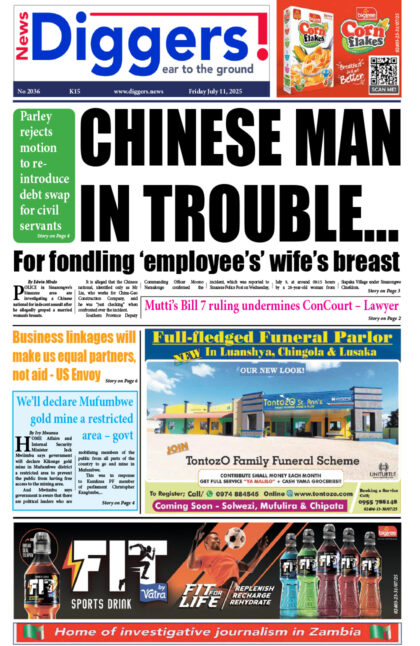WE are continuing to raise questions against the decision by Zesco to implement the smart metering project at a cost of US$40 million. We recall that a few months ago when the power utility announced an increase in electricity tariffs, we wondered why Zesco was increasing the price of a commodity that it did not have in stock. Despite the objection from the public, Zesco went ahead and effected the increase amid long hours of load shedding. Months after that increase, Zesco is back to announce that they will now install smart metres which will enable them to regulate energy consumption in a household. We have the right to raise further questions on this issue and we want Zesco to come out and provide an explanation.
We still have a load shedding schedule of between eight and 12 hours in most parts of the country. People have bought units at a very high cost but the service is not there. Now on top of that, they are saying once power is restored, Zesco will have the right to regulate how that power is consumed. We stated yesterday that this kind of thinking is very dangerous.
Yesterday, we had a privilege of engaging with the Zesco senior manager for corporate affairs Dr John Kunda who attempted to explain the reasoning behind this initiative. Unfortunately, we are not satisfied that his explanation makes business sense. In our view, Zesco is not fully prepared to provide answers to its customers who are concerned about this decision.
We asked Dr Kunda: What role is ERB going to play in this because we would like to believe that the regulatory authority must have a role to play in the new initiative? Will this be within your legal framework? What right has the service provider have to intrude in customers’ households and be able to control the appliances? Has the Energy Regulation Board and the Competition and Consumer Protection Commission allowed you to do this?
To this, Dr Kunda responded: “To be honest with you, I would be incompetent to speak on the regulators’ interventions or role but of course, whatever we implement as Zesco is within the legal framework. We respect individuals’ privacy in providing this service. Nothing will be implemented that jeopardises that. But your concerns are valid and I would like bene Hang’andu at ERB to give you answers from the regulator’s perspective.”
This would suggest that Zesco has not done its homework. They have not yet engaged all the stakeholders to hear their views and concerns. How can a national power utility go ahead to announce such a move before setting out a clear implementation roadmap? There is a problem. Zesco is doing things in a trial and error manner. They are not sure about the cost benefit for this undertaking, but they are determined to do it. Why?
Our advice to Zesco is that they need to swallow their pride and begin to seriously look at unbundling. Zesco, in its current state, has been unable to attract investments because the generation, transmission and distribution is being handled by the same management, the same command centre. If generation and transmission was moved to another unit, it would attract investment, which would improve the load management that they are trying to address with that colossal amount of money.
It’s not long ago when Zesco was on a project of moving customers from fixed charges to pre-paid or metering system. The metering project is just finishing now. Some installations around the country are probably still on fixed charges. Now, already, they want to do away with all the meter boxes which they are still installing in people’s houses so that they can put another set of boxes! Where will they take these current metre boxes, which we understand are in excess of one million? Will they just throw them away? How much financial wastage is that?
This is what we mean when we say there is a management crisis at Zesco. Our people must realise that the leadership at Zesco has run out of ideas. Initiatives such as the one being suggested using the so called smart meters is a call for help. This is Zesco now shouting Mayday! Mayday! They want help from the customers, they can’t think of any other way out.
We would like to advise citizens to take this distress signal from Zesco very seriously if they want their small businesses to stay alive. When you are in a fast moving vehicle and you see the driver jumping out, just know that you are headed for disaster. When your pilot takes up the crash position, you must not argue with his judgement; he knows there is nothing else he can do. Zesco says switch to solar and gas, listen to them. They know what they are talking about. Amano nayapwa, if they had a way, they would start selling charcoal to their customers.




















One Response
Kikiki! Yaba. Selling charcoal?